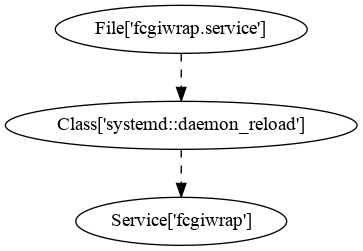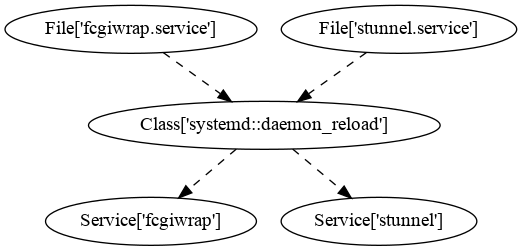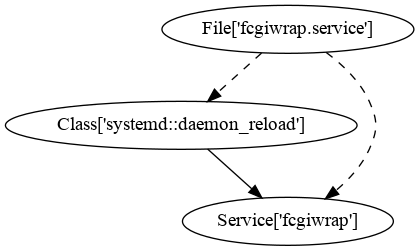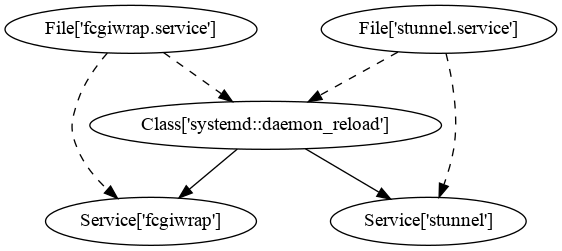systemctl daemon-reload and Puppet
Update: Puppet 6.1 adds support for automatically calling
systemctl daemon-reload when required, making the technique described in this
post redundant.
I manage my machines at home (and at work) with Puppet, a
configuration management tool. Sometimes one of my manifests needs to change a
systemd service’s configuration – for example, if the upstream
package didn’t ship with a unit file, or to override some settings in a
.service.d directory. systemctl daemon-reload needs to be executed after
changing configuration in the /etc/systemd directory, but Puppet doesn’t have
built-in support for this.
Our initial solution at work was to create a systemd::daemon_reload class. It
contains a single exec resource that runs systemctl daemon-reload when the
class receives a refresh notification:
class systemd::daemon_reload {
exec { '/usr/bin/systemctl daemon-reload':
refreshonly => true,
}
}
We then set up notification relationships from:
- Any unit files in
/etc/systemd/systemto thesystemd::daemon_reloadclass. - The
systemd::daemon_reloadclass to the corresponding service.
For example, we’d do something like the following to create a custom unit file
for fcgiwrap:
class fcgiwrap {
include ::systemd::daemon_reload
file { '/etc/systemd/system/fcgiwrap.service':
# ...
notify => Class['systemd::daemon_reload'],
# ...
}
service { 'fcgiwrap':
# ...
subscribe => Class['systemd::daemon_reload'],
# ...
}
}
This creates the following dependency graph, with dashed lines representing a notification dependency:

This solution works nicely if you only have a single service. If
fcgiwrap.service is updated, a notification is sent to the
systemd::daemon-reload class, which invokes systemctl daemon-reload. In
turn, a notification is sent to the fcgiwrap service, which is restarted.
However, it doesn’t work so well if you introduce more than one service. Here’s
what the dependency graph looks like if we add a custom unit file for stunnel
in the same way:

If any unit file is edited the notification dependencies cause every service to be restarted. This isn’t ideal if you have lots of services in a production environment where you want to minimize downtime caused by configuration changes.
I recently came up with a better solution to this problem by using a mixture of normal order-only dependencies and notification dependencies:
- The unit files notify
systemd::daemon_reloadand the service resource. - The service resource has an order-only (but not notification) dependency
on
systemd::daemon_reload.
The changes to the code are minimal:
class fcgiwrap {
include ::systemd::daemon_reload
file { '/etc/systemd/system/fcgiwrap.service':
# ...
notify => [
Class['systemd::daemon_reload'],
Service['fcgiwrap'],
],
# ...
}
service { 'fcgiwrap':
# ...
require => Class['systemd::daemon_reload'],
# ...
}
}
This produces the following dependency graph, with dashed lines representing notification dependencies and solid lines representing order-only dependencies:

If fcgiwrap.service is updated, notifications are sent to both
systemd::daemon_reload and the fcgiwrap service resource, so systemctl
daemon-reload will be invoked and Puppet will restart the fcgiwrap service.
The order-only dependency additionally ensures that systemctl daemon-reload is
invoked before Puppet restarts fcgiwrap.
In the case of a single service there’s no real difference from the original
solution. However, here’s what the dependency graph looks like when we add an
additional custom unit file for stunnel:

Because the notification dependencies on systemd::daemon_reload have been
replaced with order-only dependencies, only the corresponding service is
restarted when a single unit file is changed.
Another neat side effect of this particular solution is that systemctl
daemon-reload is only executed at most once per each Puppet run – which
wouldn’t be the case with the more obvious solution of adding one
systemctl daemon-reload exec resource per unit file/service combination.